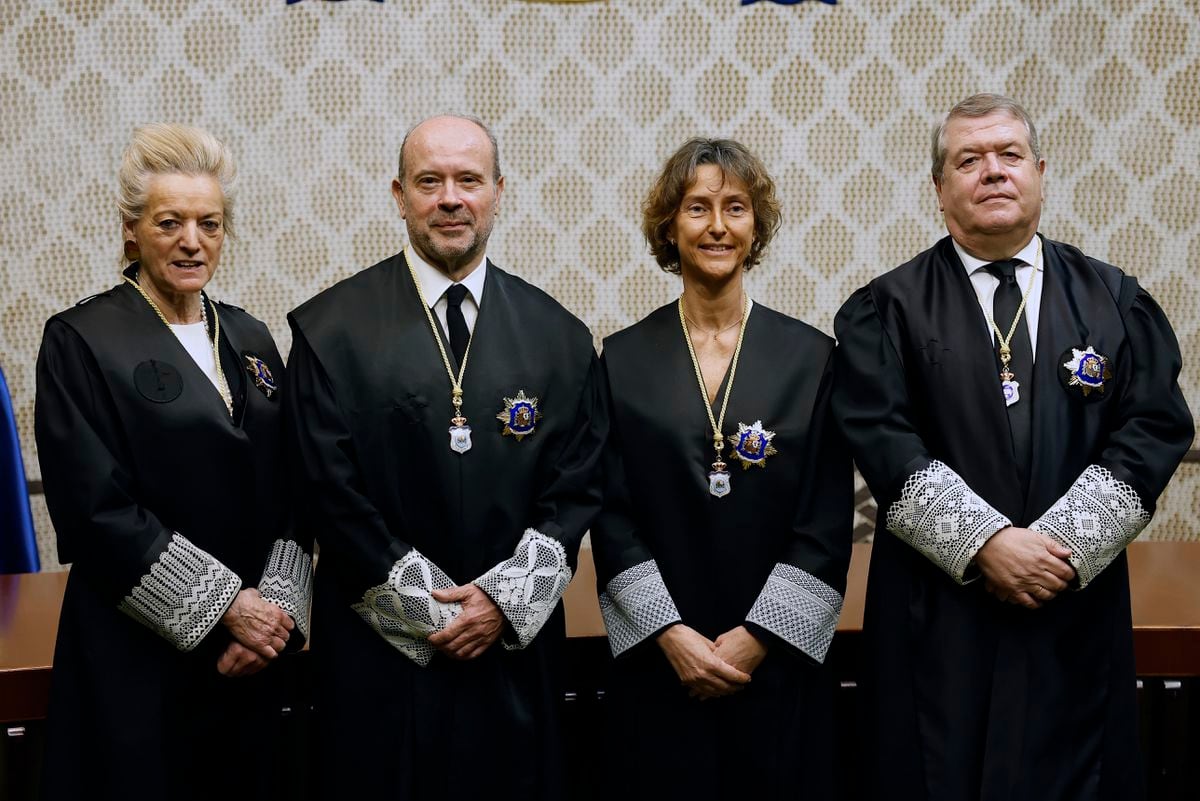Just over a week after its renewal, the Constitutional Court is facing a battery of challenges that, if successful, could render it inoperative due to a lack of
quorum.
The first request made this Wednesday, that the new magistrate Laura Díez be separated from the resources related to the 25% quota of classes in Spanish in schools in Catalonia, has already prospered.
And Díez herself has decided to abstain from it.
Now it is the turn of Vox, which on Thursday challenged four members of the court alleging their apparent lack of impartiality.
They are the president of the body, Cándido Conde-Pumpido, and the magistrates Juan Carlos Campo, María Luisa Segoviano, and Laura Díez herself, who all belong to the progressive sector.
If Vox's request goes ahead, it would leave the plenary session of the Constitutional Court reduced to seven magistrates, below the number necessary to adopt resolutions, which stands at eight.
And although there is little chance that the challenges will be admitted, in the court there is a climate of concern about the possibility that an offensive by the conservative forces is at the beginning to decimate the body of guarantees and prevent the new progressive majority from starting to pass sentences.
The objective of said majority was and continues to be that the effects of the relief be felt soon, and that the court can catch up quickly.
However, the prologue to this work will be the resolution of the challenges presented by the ultra party.
More information
Vox appeals the suppression of the crime of sedition for considering that it supposes "an amnesty" for the leaders of the 'procés'
Before Vox's challenges against the president and three court magistrates, the Assembly of the Bilingual School already questioned Díez.
This professor of Constitutional Law and former adviser to the Government of Pedro Sánchez will not take part in the deliberation and resolution of the appeal presented by PP and Cs against the law and the decree law promoted by the Generalitat of Catalonia so that the sentence that establishes the use of Spanish in Catalan schools in 25% of subjects.
The concern caused by these challenges has to do with the fact that the Constitutional Court is undergoing readjustment days in this new stage that is beginning.
The guarantee body has been made up of a progressive majority of seven magistrates who have taken over the main positions and a solid position in the four Sections and the two Chambers into which it is subdivided.
This has generated obvious discomfort in the conservative minority, which now has only four magistrates.
Therefore, the start of an offensive by the political right was expected, and the Vox initiative has taken the first step.
The weapon of challenges is a useful instrument to question the court, even if they later come to nothing.
Those of Vox are formulated in very broad terms, but even so, it is feared that they are only the beginning.
In the first place, it is requested that Conde-Pumpido be removed from the appeal against the criminal reform of sedition and embezzlement by the central Executive because the now president of the court was the State Attorney General with a PSOE government.
Although some subjective facts are also alluded to, such as having been described in various media as "the candidate of La Moncloa", attributing a "special relationship with the government party", alluding to the Socialists.
The recusal of Juan Carlos Campo opens a hypothetically broader vein.
Vox questions him "having held public office, employment or profession having participated directly or indirectly in the matter that is the subject of the lawsuit, due to his status as former Minister of Justice."
In court, it is feared that having held this position prevents Campo from participating in various legal appeals that were debated in the Council of Ministers while he was part of it.
For example, in the next plenary session, the educational reform promoted by his former partner in government, Isabel Celáa, will be discussed.
But the resources in which his intervention can be questioned the most are, obviously, those related to the Department of Justice, of which he was the head.
At the moment, Vox has not set the bar very high with the arguments they have chosen to present their challenges.
The one presented against magistrate María Luisa Segoviano is based solely on statements made in a media outlet, in which she stated that appeals related to the right to self-determination should be studied carefully, since this is a complex matter.
As for Laura Díez, also challenged for participating in the appeal against the penal reform, she is asked to abstain solely because she intervened in the opinion of the Consell de Garantíes Estatutàries that endorsed the constitutionality of the legislation of the Generalitat.
This implies that the magistrate had formed criteria on the issues that are now going to be discussed in court.
This matter led to the presentation of appeals by the PP and Cs, and a question of unconstitutionality by the Superior Court of Justice of Catalonia (TSJC).
The speaker of this sentence, derived from a consultation of the TSJC to the Constitutional Court about its doubts about the legality of the current Catalan regulations, is the conservative magistrate Enrique Arnaldo.
The agenda for next week's plenary session already includes a discussion on this matter, in which it will be decided whether or not to admit Òmnium Cultural.
Hence the rapid abstention of Laura Díez, who will not take part in this point of said plenary session.
And later on, he will also formalize his withdrawal with respect to the aforementioned two regulations of the Generalitat, in which he was a rapporteur, having assumed all the matters assigned to his predecessor, Antonio Narváez, one of those relieved in the recent renewal of the court.
Subscribe to continue reading
Read without limits
Keep reading
I'm already a subscriber




/cloudfront-eu-central-1.images.arcpublishing.com/prisa/OCS7V4Q6YKB6UMI76BXPPNGQJE.jpg)










